#evangelical lutheranism
Text
If faith is understood as belief that something is true, doubt is incompatible with the act of faith. If faith is understood as being ultimately concerned, doubt is a necessary element in it.
Paul Tillich, Dynamics of Faith, pg. 21
70 notes
·
View notes
Text
Jesus is Under the Rubble
“This Advent, while global Christians prepare to commemorate the arrival of the Prince of Peace, our Palestinian kin in Gaza suffer unthinkable violence. Their cries of deliverance, echoing those of two millennia ago, seem to be falling unheard on the United States.”
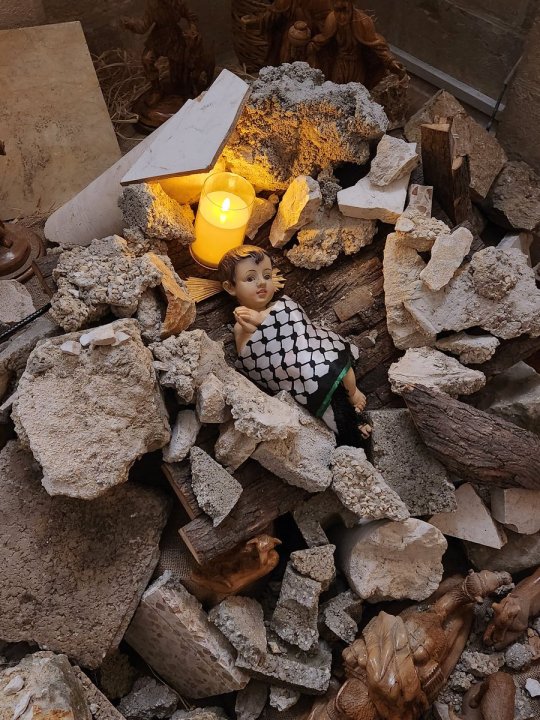
youtube
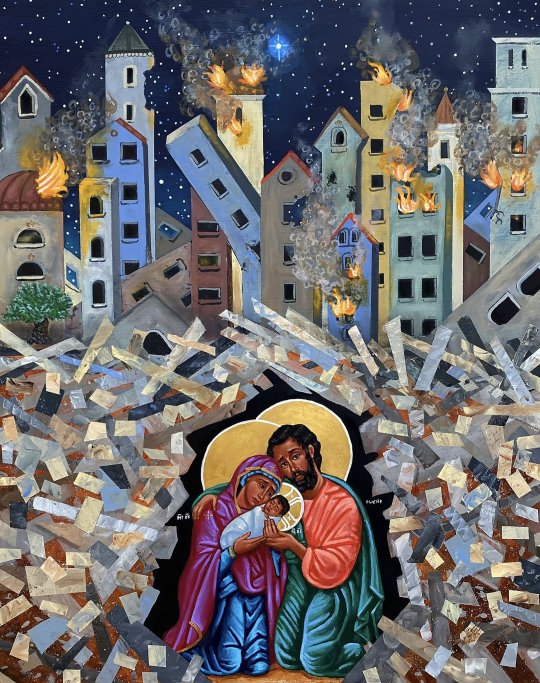
— by Kelly Latimore icons. All proceeds from sales of this digital image will go toward Red Letter Christians trusted partners in Gaza.
Transcript:
Christ in the Rubble
A Liturgy of Lament
Rev. Dr. Munther Isaac
Evangelical Lutheran Christmas Church Bethlehem
Saturday, December 23rd, 2023
We are angry…
We are broken…
This should have been a time of joy; instead, we are mourning. We are fearful.
Twenty thousand killed. Thousands under the rubble still. Close to 9,000 children killed in the most brutal ways. Day after day after day. 1.9 million displaced! Hundreds of thousands of homes were destroyed. Gaza as we know it no longer exists. This is an annihilation. A genocide.
The world is watching; Churches are watching. Gazans are sending live images of their own execution. Maybe the world cares? But it goes on.
We are asking, could this be our fate in Bethlehem? In Ramallah? In Jenin? Is this our destiny too?
We are tormented by the silence of the world. Leaders of the so-called “free” lined up one after the other to give the green light for this genocide against a captive population. They gave the cover. Not only did they make sure to pay the bill in advance, they veiled the truth and context, providing political cover. And, yet another layer has been added: the theological cover with the Western Church stepping into the spotlight.
The South African Church taught us the concept of “The state theology,” defined as “the theological justification of the status quo with its racism, capitalism and totalitarianism.” It does so by misusing theological concepts and biblical texts for its own political purposes.
Here in Palestine, the Bible is weaponized against our very own sacred text. In our terminology in Palestine, we speak of the Empire. Here we confront the theology of the Empire. A disguise for superiority, supremacy, “chosenness,” and entitlement. It is sometimes given a nice cover using words like mission and evangelism, fulfillment of prophecy, and spreading freedom and liberty. The theology of the Empire becomes a powerful tool to mask oppression under the cloak of divine sanction. It divides people into “us” and “them.” It dehumanizes and demonizes. It speaks of land without people even when they know the land has people – and not just any people. It calls for emptying Gaza, just like it called the ethnic cleansing in 1948 “a divine miracle.” It calls for us Palestinians to go to Egypt, maybe Jordan, or why not just the sea?
“Lord, do you want us to command fire to come down from heaven and consume them?” they said of us. This is the theology of Empire.
This war has confirmed to us that the world does not see us as equal. Maybe it is the color of our skin. Maybe it is because we are on the wrong side of the political equation. Even our kinship in Christ did not shield us. As they said, if it takes killing 100 Palestinians to get a single “Hamas militant” then so be it! We are not humans in their eyes. (But in God’s eyes… no one can tell us we are not!)
The hypocrisy and racism of the Western world is transparent and appalling! They always take the words of Palestinians with suspicion and qualification. No, we are not treated equally. Yet, the other side, despite a clear track record of misinformation, is almost always deemed infallible!
To our European friends. I never ever want to hear you lecture us on human rights or international law again. We are not white— it does not apply to us according to your own logic.
In this war, the many Christians in the Western world made sure the Empire has the theology needed. It is self-defense, we were told! (And I ask: how?)
In the shadow of the Empire, they turned the colonizer into the victim, and the colonized into the aggressor. Have we forgotten that the state was built on the ruins of the towns and villages of those very same Gazans?
We are outraged by the complicity of the church. Let it be clear: Silence is complicity, and empty calls for peace without a ceasefire and end to occupation, and the shallow words of empathy without direct action— are all under the banner of complicity. So here is my message: Gaza today has become the moral compass of the world. Gaza was hell on earth before October 7th.
If you are not appalled by what is happening; if you are not shaken to your core— there is something wrong with your humanity. If we, as Christians, are not outraged by this genocide, by the weaponizing of the Bible to justify it, there is something wrong with our Christian witness, and compromising the credibility of the Gospel!
If you fail to call this a genocide. It is on you. It is a sin and a darkness you willingly embrace.
Some have not even called for a ceasefire.
I feel sorry for you. We will be okay. Despite the immense blow we have endured, we will recover. We will rise and stand up again from the midst of destruction, as we have always done as Palestinians, although this is by far the biggest blow we have received in a long time.
But again, for those who are complicit, I feel sorry for you. Will you ever recover from this?
Your charity, your words of shock AFTER the genocide, won’t make a difference. Words of regret will not suffice for you. We will not accept your apology after the genocide. What has been done, has been done. I want you to look at the mirror… and ask: where was I?
To our friends who are here with us: You have left your families and churches to be with us. You embody the term accompaniment— a costly solidarity. “We were in prison and you visited us.” What a stark difference from the silence and complicity of others. Your presence here is the meaning of solidarity. Your visit has already left an impression that will never be taken from us. Through you, God has spoken to us that “we are not forsaken.” As Father Rami of the Catholic Church said this morning, you have come to Bethlehem, and like the Magi, you brought gifts with, but gifts that are more precious than gold, frankincense, and myrrh. You brought the gift of love and solidarity.
We needed this. For this season, maybe more than anything, we were troubled by the silence of God. In these last two months, the Psalms of lament have become a precious companion. We cried out: My God, My God, why have you forsaken Gaza? Why do you hide your face from Gaza?
In our pain, anguish, and lament, we have searched for God, and found him under the rubble in Gaza. Jesus became the victim of the very same violence of the Empire. He was tortured. Crucified. He bled out as others watched. He was killed and cried out in pain— My God, where are you?
In Gaza today, God is under the rubble.
And in this Christmas season, as we search for Jesus, he is to be found not on the side of Rome, but our side of the wall. In a cave, with a simple family. Vulnerable. Barely, and miraculously surviving a massacre. Among a refugee family. This is where Jesus is found.
If Jesus were to be born today, he would be born under the rubble in Gaza. When we glorify pride and richness, Jesus is under the rubble.
When we rely on power, might, and weapons, Jesus is under the rubble.
When we justify, rationalize, and theologize the bombing of children, Jesus is under the rubble.
Jesus is under the rubble. This is his manger. He is at home with the marginalized, the suffering, the oppressed, and displaced. This is his manger.
I have been looking, contemplating on this iconic image….God with us, precisely in this way. THIS is the incarnation. Messy. Bloody. Poverty.
This child is our hope and inspiration. We look and see him in every child killed and pulled from under the rubble. While the world continues to reject the children of Gaza, Jesus says: “just as you did it to one of the least of these brothers and sisters of mine, you did it to me.” “You did to ME.” Jesus not only calls them his own, he is them!
We look at the holy family and see them in every family displaced and wandering, now homeless in despair. While the world discusses the fate of the people of Gaza as if they are unwanted boxes in a garage, God in the Christmas narrative shares in their fate; He walks with them and calls them his own.
This manger is about resilience— صمود. The resilience of Jesus is in his meekness; weakness, and vulnerability. The majesty of the incarnation lies in its solidarity with the marginalized. Resilience because this very same child, rose up from the midst of pain, destruction, darkness and death to challenge empires; to speak truth to power and deliver an everlasting victory over death and darkness.
This is Christmas today in Palestine and this is the Christmas message. It is not about Santa, trees, gifts, lights… etc. My goodness how we twisted the meaning of Christmas. How we have commercialized Christmas. I was in the USA last month, the first Monday after Thanksgiving, and I was amazed by the amount of Christmas decorations and lights, all the and commercial goods. I couldn’t help but think: They send us bombs, while celebrating Christmas in their land. They sing about the prince of peace in their land, while playing the drum of war in our land.
Christmas in Bethlehem, the birthplace of Jesus, is this manger. This is our message to the world today. It is a Gospel message, a true and authentic Christmas message, about the God who did not stay silent, but said his word, and his Word is Jesus. Born among the occupied and marginalized. He is in solidarity with us in our pain and brokenness.
This manger is our message to the world today – and it is simply this: this genocide must stop NOW. Let us repeat to the world: STOP this Genocide NOW.
This is our call. This is our plea. This is our prayer. Hear oh God. Amen.
(Source)
I found these on Twitter a while ago. Original creator unknown.
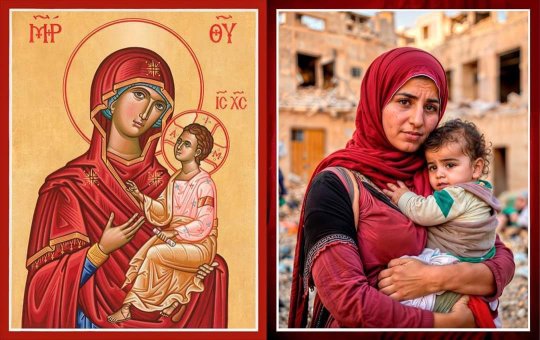
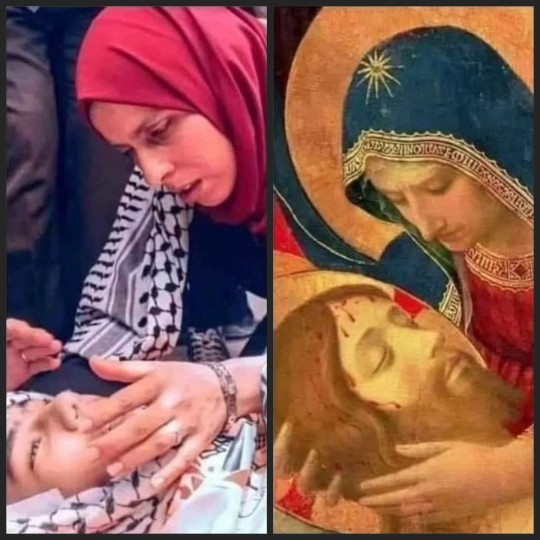
I can't stop you ascribing hateful, paranoid meanings to these images, but they're not about blaming religions. Jesus was a Jew born to a community of Jews in Palestine, the cradle of the Abrahamic faiths. He was raised and loved by them, betrayed by their rulers* and killed by Romans. He's a Prophet of Islam. End of.
*Y'know, like how the people of the Arab and Muslim nations love Palestine and crying to help them, except their leaders are greedy and rotted to the core. The ruling class will always only serve the empire.
Edit: alt text provided by @this-world-of-beautiful-monsters
#tag has stopped trending so please boost#catholicism#christmas#christianity#orthodox christianity#jerusalem#bethlehem#free gaza#save gaza#free palestine#christ child#racism#western imperialism#evangelical christianity#lutheran#us imperialism#fuck israel#israeli war crimes#israel is a terrorist state#white supremacy#colonization#manifest destiny#theology#anti zionism#christian zionism#human rights#war propaganda#i/p#knee of huss
308 notes
·
View notes
Text
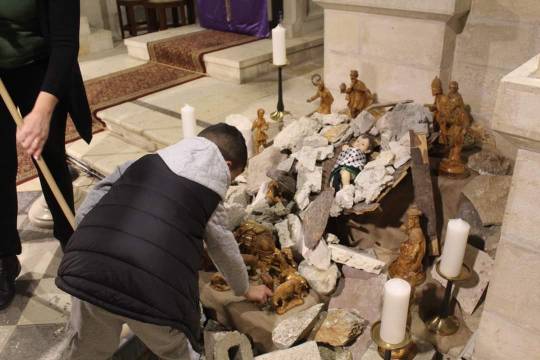


December 2023: "In Bethlehem, the city of Christ's birth, Lutherans lit advent candles around a nativity surrounded by rubble, as God's children in Gaza still are today. God sent his only Son to be with us in times of doubt, fear, and grief. God is with them in Bethlehem, He is with His children in Gaza, and He is with his children under the rubble."
Photos and text from the Evangelical Lutheran Church in Jordan and the Holy Land
#religion#christianity#lutheran#evangelical lutheran church in jordan and the holy land#christ child#advent#bethlehem#palestine#divinum-pacis
324 notes
·
View notes
Text
So much of my work rn is making me a direct audience to Palestinian Christians who are begging, pleading even, for our help. Christians, you do not get to look away from this. They are incredibly clear about what they need: ceasefire, prayers, protection. Do not look away, do not look away, do not look away.
#free palestine#palestine#israel#palestinian christians#lutheran#lutheran world federation#elca#elcjhl#evangelical lutheran church in jordan and the holy land
163 notes
·
View notes
Text
christians who dont go to church when they're on vacation are wild. why do you need a break from your religion.
#i imagine the issue for the more low church evangelical types is that they belong to a individual church#so they cant just like. attend any random one wherever theyre vacationing bc their beliefs are hyperspecific to their one church#but for the high church Christians (Catholics; Lutherans; Episcopalians; etc) i Do Not Get it#mea#also obviously this is about Christians who otherwise go to Church every sunday
148 notes
·
View notes
Text

my newest linocut
18x24
#artists on tumblr#art#my art#portrait#black and white#block printing#art student#lino carving#linocut#addiction art#recovery art#ptsd art#angel#angel art#ex Lutheran#ex evangelical#art by me#queer artist
26 notes
·
View notes
Text
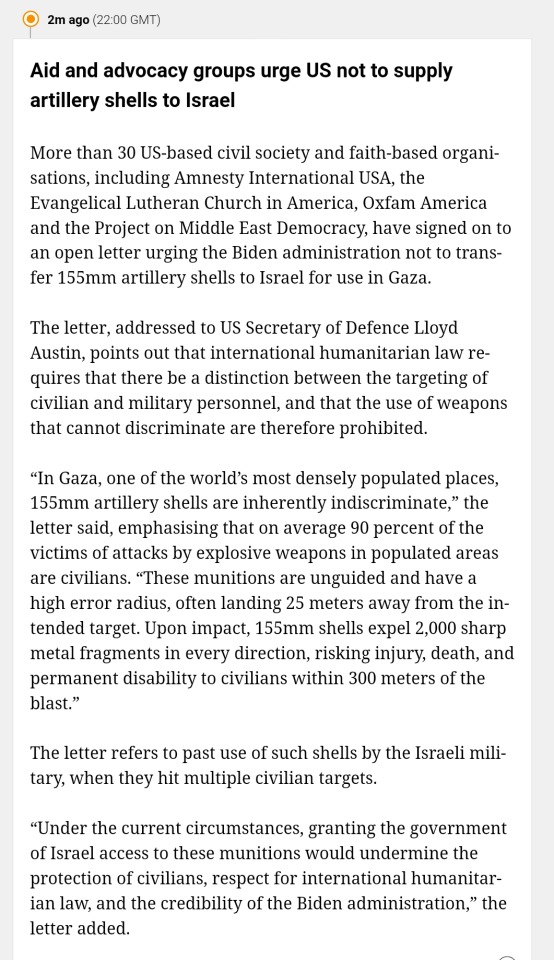
Multiple groups both civil and religious have pressed the US to refuse to supply artillery shells to Apartheid Israel
#free gaza#free palestine#gaza strip#irish solidarity with palestine#palestine#gaza#news on gaza#al jazeera#boycott israel#israel#USA#Biden#Joe Biden#amnesty international#The Evangelical Lutheran Church#oxfam#Project on Middle East Democracy#lloyd austin#Yemen#Congo#Human Rights#Jerusalem#Tel Aviv#Current events
31 notes
·
View notes
Text
#Christblr#Poll#catholic#Baptist#evangelicals#presbyterian#pentecostal#lutheran#Methodist#Anglican#Orthodox#nondenominational#tumblr poll#my polls#polls#poll time#✝️#✝️umblr#Christian#christianity#theology#bible
11 notes
·
View notes
Text

Mother Mary
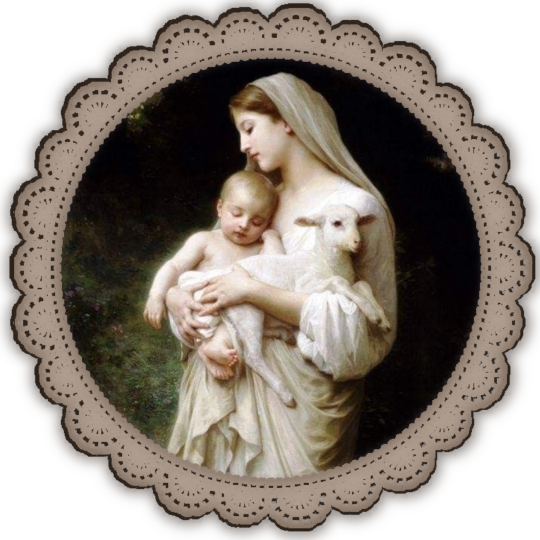

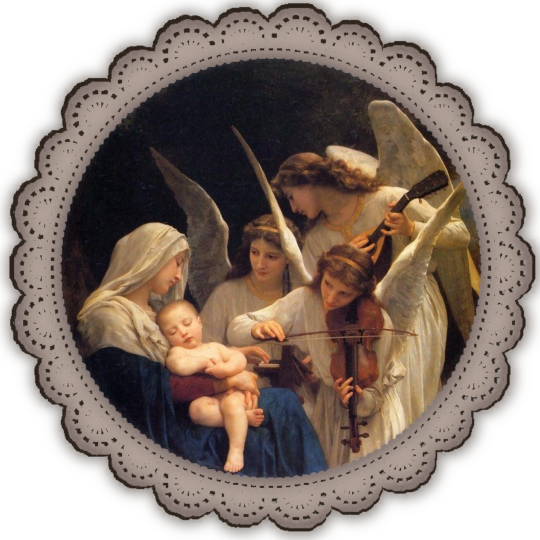
I got bored. . . I promise I’m working on requests 🙏

#──★ ˙🎧 ̟ hark! his lordship’s words!#So close to changing my tagging system but I’m being lazy…#religion#I am technically evangelical Lutheran btw… thought I should tell yall in a post instead of my rentry that I’m not sure a lot of ppl read
8 notes
·
View notes
Text

The Third Sunday of Easter
April 14, 2024
Pastor Tom Steers
Christ the Saviour Lutheran Church, Toronto
Lutheran Service Book
Divine Service III – Pages 184-202
OPENING HYMNN: 475 “Good Christian Friends, Rejoice and Sing”
https://www.youtube.com/watch?v=AwrOot61ETc
Pastor: Halleluiah, Christ is risen!
Congregation: He is risen indeed. Halleluiah!
The Introit:
Psalm 133
Behold, how good and pleasant it is
when brothers dwell in unity!
2 It is like the precious oil on the head,
running down on the beard,
on the beard of Aaron,
running down on the collar of his robes!
3 It is like the dew of Hermon,
which falls on the mountains of Zion!
For there the Lord has commanded the blessing,
life forevermore.
The Salutation – Pastor: The Lord be with you. Congregation: And also with you.
Collect Prayer:
O God, through the sacrifice of Your Son
You raised up the fallen world.
Through His death and resurrection,
He has earned us eternal life.
Grant that on our walk through this life we bear witness to our Saviour;
through Jesus Christ, our Lord,
who lives and reigns with You and the Holy Spirit, one God, now and forever. Amen.
Our Bible Readings:
First Reading – Acts 2:14a, 36-42
Psalm 116, verses 1-14
Epistle Reading – 1st Peter 1:17-25
(This week we use the text from Luke on the Emmaus disciples. The three-year lectionary Gospel passage today is Luke’s account of Jesus’ appearance to the disciples, which we read of last week in John 20:19-31. The one-year lectionary text for today is the three-year lectionary Gospel passage for next Sunday, which we will have as our reading on April 21st.)
Gospel Reading – Luke 24:13-35
THE APOSTLES’ CREED – Page 192
HYMN OF THE DAY: 476 “Who Are You Who Walk in Sorrow”
youtube
THE SERMON –
This road we call life is, at times, a difficult one.
We can feel alone, and even be led to despair, over hardship, disappointment, and loss.
The things we face in this world can cloud our vision, especially of the things of God.
We can become blind and forgetful of what God has said to us, and promised.
It was this way with two disciples of Jesus on the afternoon of the first Easter.
They were walking towards a town called Emmaus.
For some Christians, the Easter Gospel could very well begin with the words, “A long time ago in a place far away.”
Or in other words they’ve lost a personal connection to the resurrection.
For them it only has a past and future significance, but no present, every day value.
When life takes a downward turn, as it does from time to time, they don’t feel the presence of their Saviour, but are lost in the griefs of the day.
And they may try to fill this perceived void, what they feel is an absence of God, with a personal ‘works righteousness.’
Not seeing their Lord, not seeing the Gospel, they try to fill the emptiness with the Law of God.
What they say in effect is that while Christ is gone and we’re left to our own devices here’s what you need to do.
And it’s an attempt to fill the empty tomb of Jesus with a false belief that we must be perfect before Christ will reappear to us.
But this is what makes us as a Church, as Biblical Lutheran followers of Christ, different.
Because we not only celebrate a past event – the resurrection.
We don’t just say, ‘Christ is Risen,’ and gone back to heaven, and one day we’ll see Him again.
No, we celebrate the living, triumphant Jesus Christ.
As the Church we celebrate the marriage feast of the Bridegroom who laid down His life for us and in a very real and present way, is with us today: in Spirit, in His Holy Word, and in His Body and Blood in the Lord’s Supper.
Consider the Gospel account in today’s reading.
The two disciples on the road to Emmaus knew the Scriptures.
But they hadn’t really taken them in, they hadn’t truly understood them.
Because they didn’t see Jesus in them from start to finish.
And at first, they don’t see Christ in front of them on that road.
Physical sight alone, is not enough to recognize who Christ is.
Human reason is not sufficient to recognize Jesus as the Risen Saviour.
Christ had directly told the disciples He would die and rise again on the third day.
But until He appeared to them, they didn’t believe.
No, our eyes and ears must be opened by God Himself.
It took God’s only Son, Jesus to reveal His presence.
The hearts of the Emmaus disciples burned with joy as they understood the Scriptures when explained by Christ.
Here is one of many places where Jesus tells us how to interpret the Bible correctly.
Jesus tells us that if you do not see the Bible as God’s Word and see Him throughout it you get lost on the road; you won’t see Christ even when He’s right in front of you.
As Lutherans we believe that from the very first verses of Moses through to the prophets and all Scripture, God’s Holy Word is about Jesus.
He’s there in the Garden of Eden in God’s promise that a Saviour would come.
He’s present throughout the Old Testament, as well as the New.
It’s all about our Saviour, for us.
When Jesus is the key to scripture the Bible is not a tangled dead-end road.
When Jesus is the key to scripture, we understand God’s Law is a mirror that shows us our sin and a guide for us, but not the means of salvation.
Jesus used the scriptures to reassure the grieving, despairing Emmaus disciples.
They thought they’d been left alone.
But Christ shows them the crucifixion was not the end of the dreams and hopes of His followers.
The cross was part of the plan of redemption, of real freedom for every nation, every human being.
Christ explained that the cross was the instrument of salvation in paying our sin debt.
If there was no crucifixion, there would be no resurrection, for Jesus, or us.
Perhaps one of the best statements on this comes from the end of last week’s Gospel reading, in John, Chapter 20 (verses 30-31), when the Apostle wrote:
“Now Jesus did many other signs in the presence of the disciples, but these things are written that you may believe that Jesus is the Christ, the Son of God, and that by believing you may have life in His name.”
But for the Emmaus disciples until Christ took the bread and blessed it, as He did on the night of the Last Supper, that their eyes of faith were opened.
It took Christ Himself to open their eyes and minds, to accept that their living Saviour was there with them.
It’s the same for us.
When He instituted the Lord’s Supper Christ told us, ‘As often as you do this remember me, remember what I’ve said, remember what it means – He gave them the bread and said, “this is my body.”
He gave them the wine and said, “This is my blood shed for You for the remission of sins.”
Remember that in this Sacrament Christ is saying I remain with you, forgiving you.
And so, on this evening of Easter, three days after the crucifixion, the risen Lord
is with His disciples again.
He reveals Himself in the breaking of the bread, then vanished from their sight.
Notice that John doesn’t write Christ was no longer with them, but just that they could no longer see Him.
He was still, truly with them, in Spirit.
He had told them again, how he would remain to be with us.
Brothers and sisters, today, through the eyes of faith, we see Jesus with us again in His Holy Word, and will see Him in His Sacrament as we come to the altar for Communion.
We are not alone.
We have not been left as orphans.
Christ said, ‘lo I am with you always even unto the end of the world.’
This is the joy of Easter.
It’s not only a commemoration, but a true celebration of His resurrection and current presence with us.
In churches that do not honour the Lord’s Supper, they behave as though only moral perfection will earn you a ticket to see Christ again.
In churches that have gone back to the way of the Pharisees in seeing the Law as a way of self-justification they cannot see the risen, and forgiving Saviour with them.
But Christ came to fulfill the Law in a way we can’t, and promises to be with believing Christians, forgiving us, imperfect though we are.
And although the difficulties on the road of life are still there, the end for us isn’t death.
As the Bible says, ‘Death has been swallowed up in victory.’
Jesus is with us not only on Ester Sunday but in every ordinary day, in every pain and sorrow, and whenever we gather together in worship.
Our prayers are not long-distance letters but heard instantly by the ever-present God who loves us and wants to hear from us, wants to reassure, and comfort us.
The Emmaus disciples had been on a long walk when they arrived at their destination and sat down with Jesus.
But when they realized He was with them, they forgot their weariness, they forgot the late hour, and got up and walked back to Jerusalem.
They found the other disciples and told them they’d seen Jesus.
May God grant you the opened eyes and ears of faith to always recognize that Your Saviour is with you.
And may that knowledge, joy, and peace, be with you, now, and forever.
Amen.
THE PRAYERS OF THE CHURCH
THE SERVICE OF THE SACRAMENT
P: Blessed are You O Lord, our God, king of the universe, for you have had mercy on us and given Your only-begotten Son that whoever believes in Him should not perish but have eternal life.
C: We give You thanks Father for the redemption You have prepared for us through Jesus Christ. Grant us Your Holy Spirit that we may faithfully take communion and receive the blessings of forgiveness, life, and salvation that come from the body and blood of Christ.
P: Father, hear us as we pray as Jesus taught us.
LORD’S PRAYER
C: Our Father, who art in heaven, hallowed be Thy name, Thy kingdom come, Thy will be done on earth as it is in heaven; give us this day our daily bread; and forgive us our trespasses as we forgive those who trespass against us; and lead us not into temptation, but deliver us from evil. For Thine is the Kingdom, and the power and the glory, forever and ever. Amen.
Preface
P: The Lord be with you.
C: And also with you.
P: Lift up your hearts.
C: We lift them to the Lord.
P: Let us give thanks to the Lord our God.
C: It is right to give Him thanks and praise.
P: It is truly meet, right, and salutary, that we should at all times, and in all places, give thanks to you, O Lord, Holy Father, Almighty and Everlasting God.
For in the mystery of the Word made flesh, You have given us a new revelation of Your glory; that seeing You in the Person of Your Son, we may be drawn to the love of those things which are not seen.
The Words of Our Saviour
Instituting The Lord`s Supper – Page 197
P: The peace of the Lord be with you always.
C: Amen.
Lamb of God (Agnus Dei)
P: Lamb of God You take away the sin of the world,
C: Have mercy on us.
P: Lamb of God You take away the sin of the world,
C: Have mercy on us.
P: Lamb of God You take away the sin of the world,
C: Grant us peace.
The Distribution
(Our hymn during distribution is 627 “Jesus Christ. Our Blessed Saviour”)
Post Communion Collect (Right-hand column) Page 201 of our Hymnal
Salutation and Benedicamus Page 201
Benediction (stand) Page 202
Our Closing Hymn: 879 “Stay with Us”
youtube
#christian religion#lutheran#christian#faith#jesus#salvation#bible#evangelism#holy spirit#religious art#Youtube
3 notes
·
View notes
Text
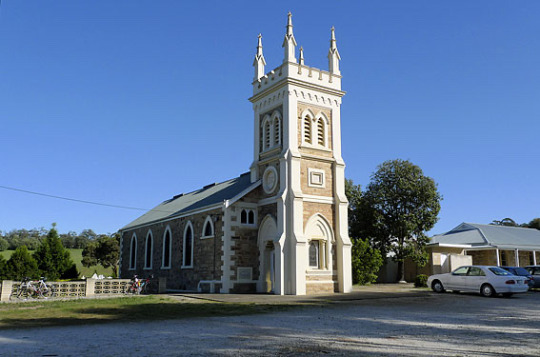
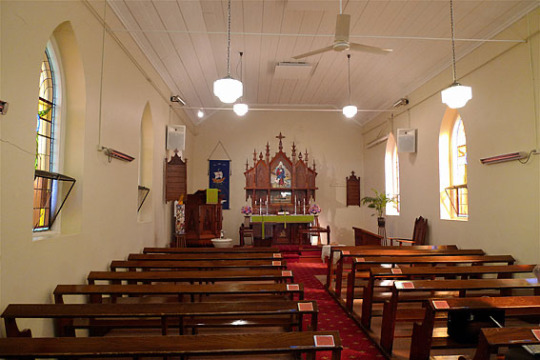
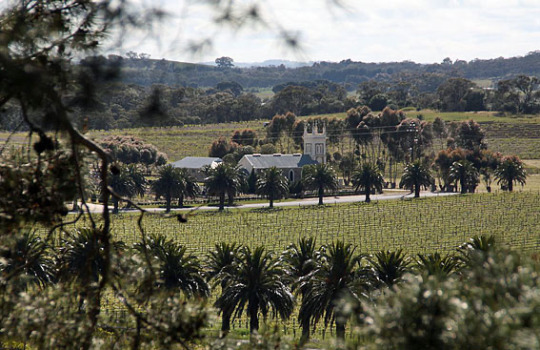
St Michael’s Gnadenfrei Lutheran Church, Marananga, South Australia.
German Lutherans immigrated to Australia in the early 1800s to escape persecution in Prussia, where they were expected to conform to Calvinist doctrine and rites. Known as ‘Old Lutherans’, they came to Australia to worship God in the good old way.
The word ‘Marananga’ means ‘my hands’ in the language of the local Overland Corner tribe of Australian Aborigines.
Photos not mine.
#confessional lutheranism#evangelical lutheranism#old lutherans#german australian#australia#immigration#churches#religion in australia
1 note
·
View note
Text
As someone for whom both spirituality and religion (having a community and an institution with its own traditions, structure, and resources, centering around spirituality and a shared value system) is important, I am really frustrated at the direction religion has gone in U.S. society.
We all know and agree that there are really deep problems with organized religion in the U.S.
What pisses me off though is that, instead of people changing and reforming the religion while keeping the good aspects of it, I see people digging in their heels behind the bad aspects while throwing out the good.
As an example, I attended a Lutheran church in Cleveland Heights, Ohio, during the year I lived there. I found the church meaningful and supportive in multiple ways. The church hosted events, including contradances, and I met some friends at events hosted in the building, during a time in my life where I was having trouble meeting people. I liked the services too. The pastor would give thought-provoking sermons that I felt challenged my value system and helped me to grow. Also, the church had a rich and ancient liturgy. People would sing hymns in four-part harmony, and many of the words were very old and poetic. The archaic language made me reflect on it in a way that helped me find meaning. I appreciated it on a lot of levels. It was a rich sensory experience and a comfortable one, and it inspired a sense of awe and wonder.
But there was an unfortunate negative side to this church. The congregation, not the pastor, harbored extensive homophobia. The pastor supported same-sex marriage and would sometimes preach about the need to welcome gay people into the church and support them. A majority of people in the congregation didn't like this, so they banded together and ousted him. Then young people like me started leaving the church.
And you know what the church did? They decided that they needed to change something about the church to try to attract and retain young people.
So they changed the liturgy.
They got rid of the ancient hymns with four-part harmony, the hundreds-of-years-old structure to the liturgy, and brought in a projector and started having the service be projected on powerpoint slides.
I hated this so much. I already had to watch powerpoint presentations during business meetings and I didn't want to be exposed to more of this during my off time. I hated the new music too; it was insipid and I was bored out of my mind singing stupid praise songs. Furthermore, I had bad mental associations with the new music, because I associated it with right-wing evangelical Christianity, box churches, and cult-like campus ministry groups. I had started going to this church because it offered the combination of rich, ancient traditions, being faithfully preserved by a community, with progressive, thought-provoking theology and value systems.
First the church rejected the progressive aspects of the value system, and then they rejected the aesthetic and cultural elements of the service that I found helped me to get in touch with deeper spiritual feelings.
I also find it interesting and relevant that the homophobia did not come from the top down, but the bottom up. The church was an ELCA church, which not long after this all went down, started officially recognizing same-sex marriage, and the denomination voted to explicitly welcome gay and lesbian people as early as 1991. It was the members of the congregation that ruined things.
Some years after I had moved away, I went back on Google maps and I saw that the church had closed, and its building sold and converted to condominiums. This made me really sad.
I remembered the time in my life, right out of college, where I had lived within walking distance to this church and walked to it. I remembered when it used to host contradances at night and I remember meeting my two friends who I made at those dances, who were important to me during a time in my life where I was vulnerable and had few friends. My life was hard enough even with that church. After all this stuff went down, I visited a number of other churches in the neighborhood but I didn't find another one that I liked as much. Although the church kept hosting the dances until it closed, the dance also has not been replaced. There is English Country Dancing and Scottish Country Dancing at two churches in the broader vicinity but no Contra Dancing anywhere near that neighborhood any more.
And all of this is gone and won't ever be replaced.
37 notes
·
View notes
Text

A Nativity scene depicting Christ's birth with the figure symbolizing baby Jesus lying amid the rubble, a reference to the war in Gaza, inside the Evangelical Lutheran Christmas Church in the West Bank town of Bethlehem, Sunday, Dec. 10, 2023. World-famous Christmas celebrations in Bethlehem have been put on hold due to the ongoing Israel-Hamas war. (AP Photo/Mahmoud Illean)
#religion#christianity#protestantism#lutheran#evangelical lutheran church in jordan and the holy land#christ child#advent#nativity#christmas#bethlehem#war#divinum-pacis
31 notes
·
View notes
Text
eve and her family were initially written to be catholic (because that is the ONLY religion i have any personal experience with) but im kind of enraptured (LOL) by the very concept of rapturing. so i think i might make them evangelicals instead? that will be such a pain though i have 0 experience with evangelicals. or really protestants of any flavor.
#sanctuary#ugh maybe fundies. im having so mcuh trouble with this#bc i cant just go 'theyre christian' bc theres fucking#lutheran? orthodox? baptist? presbytarian? congregational? methodist? QUAKER???#im DEFINITELY going to be working with christianity rather than make up a religion#because im so bad at making up religions. it would just sound silly#also i like crucifix symbolism#i also feel like evangelicals are more ummmm relevant to todays america#but ughhhhhhhhh i dont even know what other churches look like inside. or what the fuck you Do in them#i really am also so entranced by a lot of catholic traditions too#rosary beads are a big thing. i even have a rosary in my room right now...#plus the fixation on mary which is relevant to EVE as a character#but it might work better if she DOESNT have that?#and the eucharist. do other christians even do that???#ok i looked it up they do but they arent literal about it. BORING!
2 notes
·
View notes
Text
Chapuys, while making Rochford protest his innocence of the charges against him, is evidently anxious to make him recant his Lutheranism, which the other versions of the speech do not represent him as doing. Constantine, who professes to have been present at the execution, gives an account very similar to Wriothesley's; and, as the two writers were poles asunder in their religious opinions, we may do best by accepting their versions. If so, the brilliant young courtier, poet and diplomatist, made an edifying end, but with his religious sympathies unchanged.
The Life of Anne Boleyn, Philip W. Sergeant
#nor de carles . so...three.#george boleyn#unsurprisingly LM just...doesn't mention this in her chapuys biography.#like not him reporting it nor the sources which don't corroborate it#considering its thesis is a defense of chapuys' veracity as a contemporary source you'd think more of the book would be doing that#comparing his reports of events to other contemporary reports of the same events/speeches#but like. had that been done that would be difficult to argue. so...#going to say also his 'lutheranism' bcus we know he was an evangelical but not a lutheran#he does seem to have been more 'radical' than anne in some respects wrt religion but not that far necessarily#tl; dr the gist is correct he did not denounce his religious beliefs on the scaffold. he just said he should have adhered to them#more assiduously and over and above the transient luxuries of court life
3 notes
·
View notes
Text

one of my besties response to my younger brother (23) getting engaged to his gf (21) (of barely year) last weekend already having set their wedding day to october this year
#yes we were raised evangelical lutheran you need not ask#jo jabbers#i laughed<3 shes right she should say it
4 notes
·
View notes